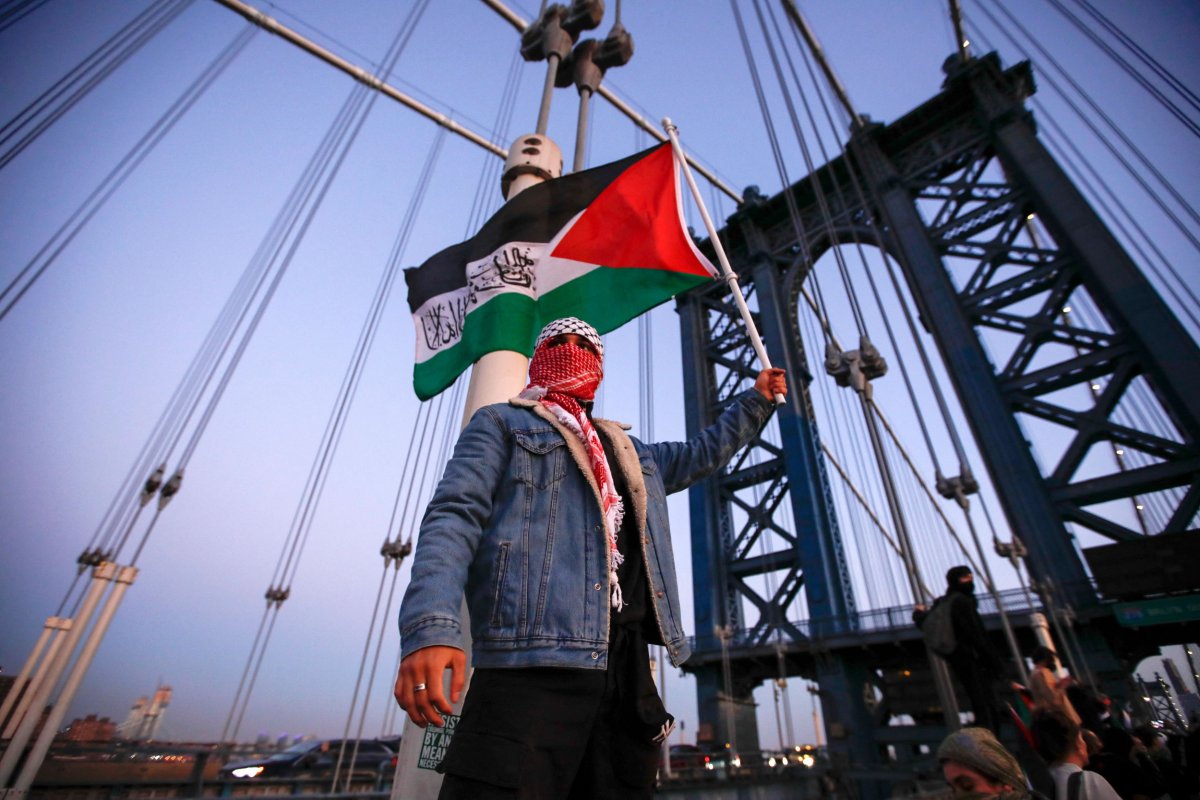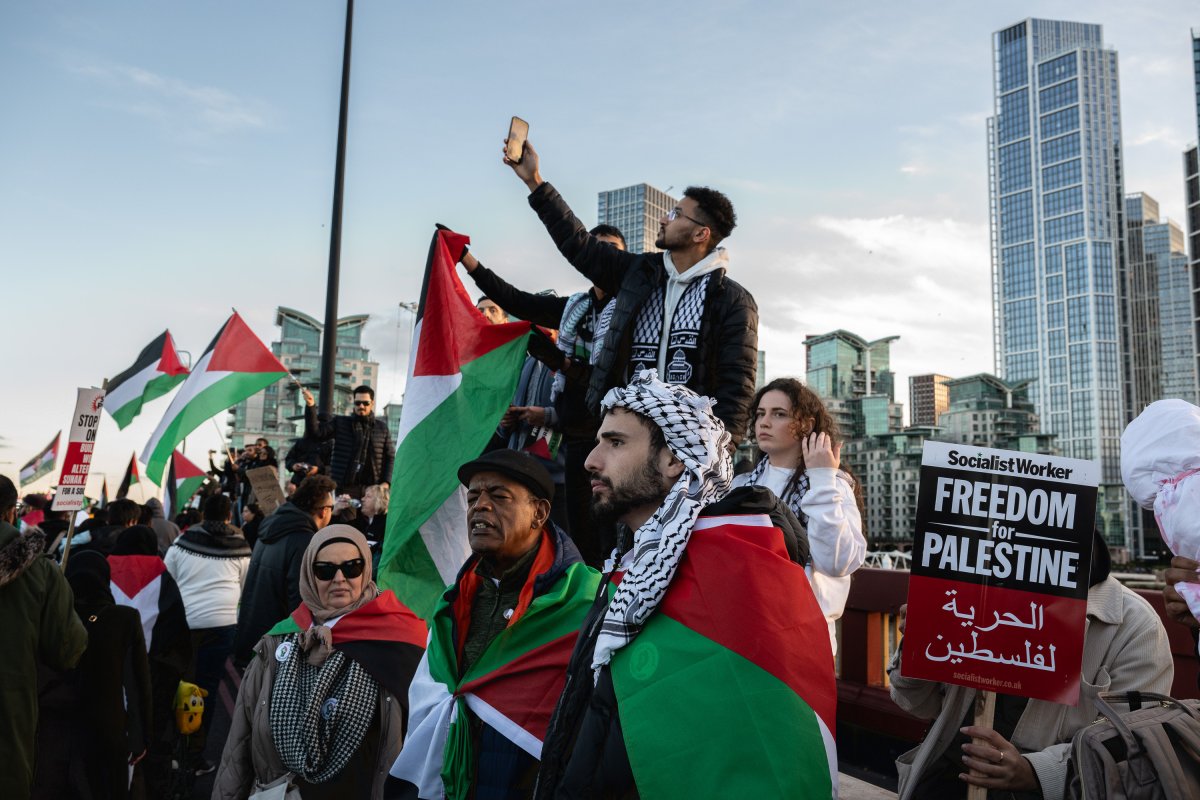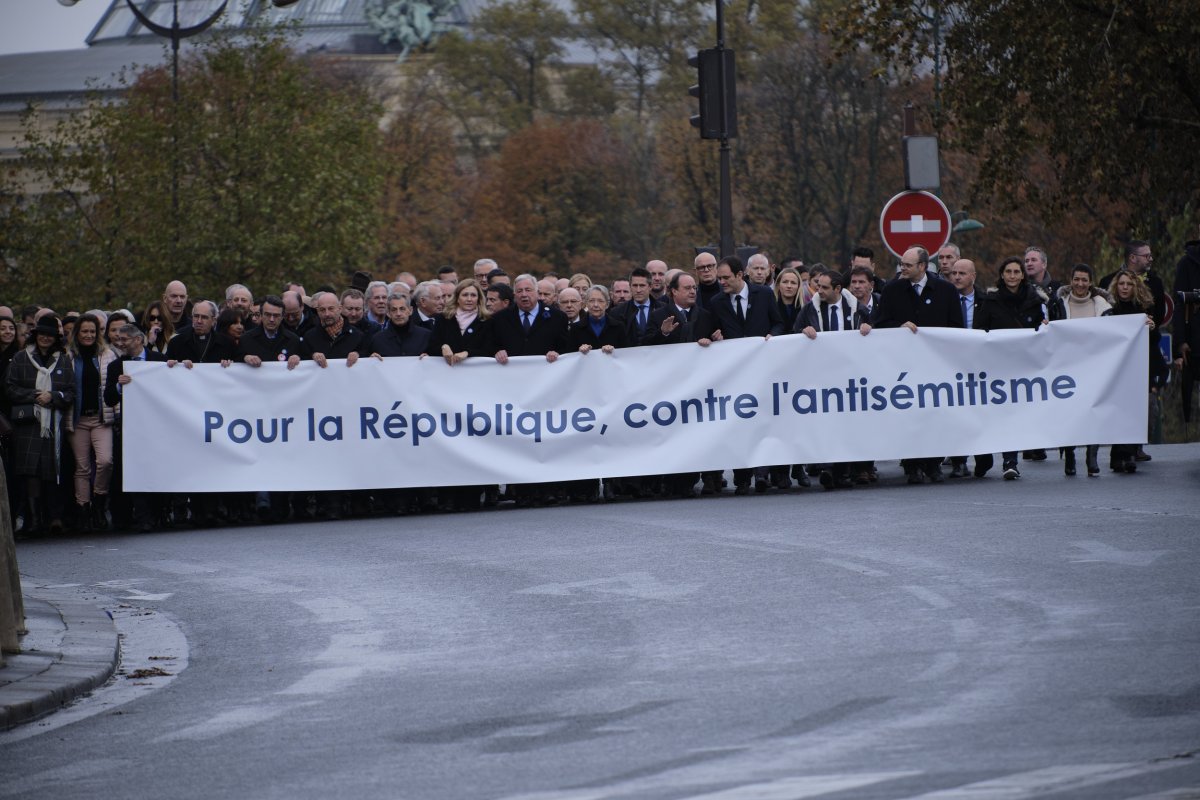David Brennan
Political clouds are gathering over the U.S. and Europe as acrid smoke columns rise over the Gaza Strip. Israel's latest campaign against Hamas militants in the Palestinian territory is roiling Western capitals and reigniting fierce debates over freedom of expression, immigration, and religion.
Western governments and opposition parties have largely lined up behind Israel following the October 7 Hamas attack, in which some 1,200 people were killed and around 240 abducted. The support remains strong, despite mounting concerns about the scale of the Israeli assault on Gaza, which has killed more than 11,070 Palestinians, per the Associated Press citing the Palestinian Health Ministry.
But administrations in the U.S., U.K., France, and Germany—among others—are grappling with a pluralistic electorate. Hundreds of thousands are marching in protests against Israel's Gaza campaign and in support of Palestinian national liberation, while counter-protests demand the end of Hamas, support for Israeli security, and stronger action against antisemitism at home.
The turmoil has unleashed extremism on both sides, prompting renewed concerns of antisemitism, Islamophobia, and genocide entwined in an Israeli-Palestinian conflict that has scarred the region across generations.
President Joe Biden is fighting on three fronts. The White House is seeking to restrain Israel from the worst brutalities, while backing its right to strike Hamas. Meanwhile, American military might has been deployed to cow Iran and its regional allies and prevent an escalation of the conflict.

Demonstrators hold Palestinian flags as they march over Brooklyn Bridge during a rally in support of Palestinians in New York City on November 7, 2023. President Joe Biden is facing growing intra-Democratic unease at his handling of Israel's war on Gaza.
At home, Biden is hoping to avoid an internal Democratic showdown. This weekend, a large pro-Palestinian protest took place in New York, while demonstrators also surrounded Biden's home in Delaware.
A poll published by The Associated Press-NORC Center for Public Affairs Research last week found a deep divide among Democrats on Israel's war, with 46 percent disapproving of how the president has handled the situation. Fifty percent approve of Biden's performance.
There are significant demographic variations in the party's internal debate. A majority of Democrats younger than 45 (65 percent) and non-white Democrats (58 percent) disapprove of Biden's handling of the conflict, while most Democrats aged 45 and older (67 percent) and white Democrats (62 percent) approve. Newsweek has contacted the White House by email to request comment.
In Europe, the response has largely been to crack down on the pro-Palestinian side of the debate, heightening tensions with large Muslim populations sympathetic to the Palestinian plight.
German and French authorities have banned pro-Palestinian protests, while national and local governments in Austria, Hungary, and Switzerland have pursued similar measures. European officials have justified the new restrictions as fighting antisemitism, while critics say they are being silenced and criminalized by racist and Islamophobic measures.
Yezid Sayigh, a senior fellow at the Carnegie Middle East Center in Beirut, Lebanon, told Newsweek that some European leaders are acting in line with their domestic priorities. "They do this with their own political populations in mind," he said. "They're 'instrumentalizing' what happens in Israel-Palestine and the fight against antisemitism.
"Why have they made this the flashpoint, the litmus test of politics? I think it has to do with their own politics," Sayigh added. "Ultimately, their support for Israel is a way of defending their own political position at home in the face of rising right-wing populism, while in effect dismantling the defense against that populism. I see this in a much broader, historical global perspective."
Europe's nationalists apparently see an opportunity amid the furore. British soccer hooligans descended on London this weekend, spoiling for a fight with a massive pro-Palestinian march, though only ended up clashing with police. Home Secretary Suella Braverman was fired from her post on Monday, having spent weeks stoking tensions and branding pro-Palestinian rallies "hate marches."

Pro-Palestinian marchers are pictured on Vauxhall Bridge on November 11, 2023 in London, U.K. Pro-Palestinian demonstrations have become a divisive political issue across Western Europe in recent weeks.
Keir Starmer, the leader of the opposition Labour Party—traditionally home to more pro-Palestinian sentiment—has been desperately dodging any hint of criticism of Israeli conduct, fearing a repeat of the antisemitism row that did much to sink his predecessor Jeremy Corbyn.
Starmer's caution has prompted a shadow cabinet member to resign his post, while the chair of the Labour Muslim Network has warned that the party is "losing seats and Muslim voters."
In France, far-right populist leader Marine Le Pen took part in a 100,000-person march against antisemitism, despite her own family history of anti-Jewish politics. Also marching was President Emmanuel Macron, who has condemned the unbearable resurgence of antisemitism in the country. Fighting to keep the Le Pen threat at bay, Macron has vowed zero tolerance amid a rise in attacks against Jewish people and institutions.
The campaign against antisemitism, Sayigh said, is "a crucial fight that we all need to wage." But, he added, key European governments are falling badly short. He pointed to Germany as an example, where in 2021 authorities recorded a 29 percent jump in antisemitic crimes overwhelmingly driven by far-right extremists.
"This, I think, demonstrates that the German political establishment has failed miserably in combating the roots of antisemitism within its own ranks," Sayigh said. "Partly because it's obfuscated everything by making this about immigrants—Muslim, Arab, and others."
"They're fetishizing the fight against it rather than actually waging it properly," he added.
As the war wears on and anger metastasizes, there are fears of new waves of antisemitic and Islamophobic violence on Western soil. FBI Director Christopher Wray this month said that the terror threat had increased to a "whole other level" amid the reignited Middle East conflict.
Mohanad Hage Ali, the deputy director for research at the Malcolm H. Kerr Carnegie Middle East Center, told Newsweek: "I'm just hoping that we won't see another wave of terror attacks, seeing that most of ISIS and Al-Qaeda have lost their networks and their ability to operate. But I suppose the past few weeks have given them a lot of material to work with. That's the fear."
Deepening discord and potential violence on the home front will energize and embolden the far-right, Ali added. "It all feeds into this vicious cycle that will make things worse for everyone," he said. "Ironically, these Muslims, if they look around, they'll find Jewish populations to be their primary allies."

Former French presidents and other senior politicians are among those pictured holding the banner declaring: "For the Republic, against anti-Semitism" during a march against antisemitism on November 12, 2023 in Paris, France. Several European nations are cracking down on pro-Palestinian marches.
As Israel's devastating war grinds on, the future looks bleak for the Palestinians. Gaza has—again—been ravaged, with little indication of how the territory will be governed post-conflict. The Israeli-occupied West Bank is again being thrust into violence, with more than 153 Palestinians there killed by the Israel Defense Forces and extremist settlers, per Associated Press data.
The horror of October 7 and the outrage it prompted in the West has set the stage for a deeper crisis, Sayigh said. "The Palestine conflict has become a lightning rod," he added.
Hamas, Sayigh said, has made the Palestinian cause the key trigger for a much wider conflagration, which will may yet have little to do with the Palestinians or Gaza. October 7 could yet prove akin to "Sarajevo 1914," Sayigh said, referring to the assassination of Archduke Franz Ferdinand that sparked World War I.
No comments:
Post a Comment